Sachi Maniar: Blooming Where Planted
“Today, what I believe is my truth for today. Tomorrow, it may change, but at least if that’s what I believe today, I should give it my all,” Sachi tells us.
 Every once in awhile, you might meet someone who’s really seeking something more out of life. Who asks questions that are so genuine, it disarms you. Or who lives so wholeheartedly, it makes you wonder about your own life choices.
Every once in awhile, you might meet someone who’s really seeking something more out of life. Who asks questions that are so genuine, it disarms you. Or who lives so wholeheartedly, it makes you wonder about your own life choices.
Sachi Maniar is one of those people. In this Awakin Call moderated by Amit and Rahul, our own Sachmo (as she is lovingly called) reflects candidly on the trials and tribulations of living a life aligned to service.
Amit: In 2003, you had traveled to the war-torn areas of Jammu and Kashmir, and you ended up shooting your first documentary film out there, under some very challenging circumstances. What brought you out there? What ended up driving you to create this film?
S: In school and college, I was always a little more patriotic. I was always rigid about people standing straight in national anthems and things like that. [Laughs] So I was really fascinated with the army. I wanted to join the air force at one point. I wanted to be in the army and do something for my country. So a bunch of us wrote the army and said, “We want to visit you guys and see what you do”.
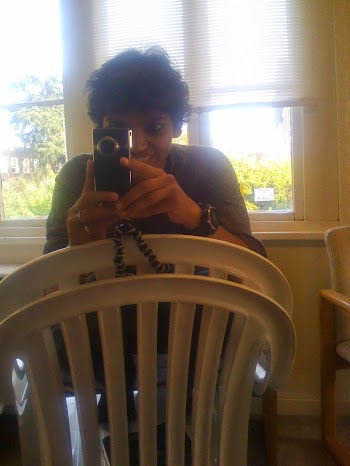 It was very long— we had to do nine months of paperwork. But we got in. We got to visit these war-torn areas. I was traveling with nine media students, and I was the only one studying economics and political science. I really didn’t know anything about filmmaking or cameras, but it so happened that when we got back, those nine people got really busy, and I had to make the film. So that’s how I stumbled upon filmmaking.
It was very long— we had to do nine months of paperwork. But we got in. We got to visit these war-torn areas. I was traveling with nine media students, and I was the only one studying economics and political science. I really didn’t know anything about filmmaking or cameras, but it so happened that when we got back, those nine people got really busy, and I had to make the film. So that’s how I stumbled upon filmmaking.
A: You brought up this issue with Jammu and Kashmir, and the issue between India and Pakistan. I know you ended up working with this organization called Friends Without Borders.
S: I had gone to Kargil thinking, “I want to be one of those people who do something for my country. I want to die for my country”. After that, I joined an organization called Beyond Borders. One of the workshops we had was on conflict, and the facilitator, Vinod, kept asking me why I hated Pakistan. I mean, I didn’t hate Pakistan, but I was pro-war. I kept supporting India at the time because I am an Indian. He kept questioning me, and after awhile, I realized that all these things were so superficial. I came to the conclusion that I didn’t really hate Pakistan. Beyond Borders was an organization where there were people from India, Pakistan, Bangladesh, Sri Lanka. And so, actually, when I met my Pakistani friends, it was amazing. So all my locked views dissolved then.
And then, of course, I got connected to John and Rahul, and Mark and Yoo-Mi, and MAM movies. So that’s how Friends Without Borders happened.
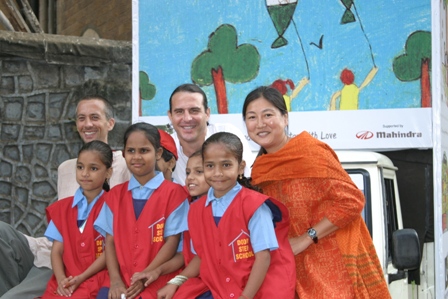
A: Can you share a little more about what Friends Without Borders did?
S: Friends Without Borders was an organization where young people—kids—from India wrote letters to kids from Pakistan, and kids from Pakistan wrote letters to kids from India. The idea was if we connect the hearts of children, and we connect the young generation, at least some of these ideas will start changing, just as mine did.
My ideas changed drastically. From joining the army and fighting the war against Pakistani soldiers, to actually making friends. Some of my best friends are from Pakistan.
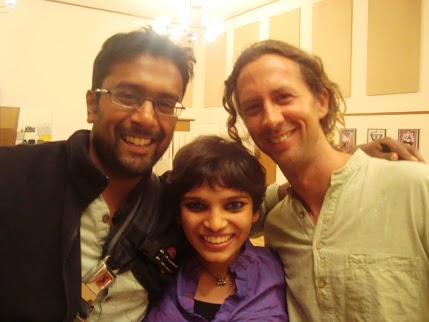
A: You bring up a really good point. That becomes such a heated issue. What helped you actually transform to that space of heart-connection, rather getting lost in that nationalism?
S: I really feel that when you just have a decent connection with somebody, and you connect heart-to-heart, that’s the end of it. You don’t then see those barriers of cast, religion, countries, nationalities—nothing. For me, I think when Vinod kept questioning me, I just realized that there are so many barriers, so many glasses that I put on. For no reason. And it’s just about removing them and seeing a person as you and seeing yourself in that person.
Rahul: One of the things that inspires me about you is your ability to be so wholehearted with whatever you’re doing. How do you generate that excitement and wholeheartedness that you just put into everything?
S: Energy comes easy to me—I can’t sit still! [Laughs]
It’s something that just happens. I feel like today, what I believe is my truth for today. Tomorrow, it may change, but at least if that’s what I believe today, I should give it my all.
A: That same spirit is what has taken you across so many different organizations. I mean, if someone looks at your service track record, they’re just blown away by all the different organizations you’ve worked with, all the different issues you’ve tried to focus on. Is there something that’s driving you to do this? Especially at such a young age?
S: I’ve always been attracted to—I hate calling this social work, but yes—social work. I feel like that’s who I am. I get attracted to knowing what an organization is up to. If I hear about some good organization, I’ll go and make a visit. And that could be something as random as I hear about them today and tonight I’ll be on a train to go see them. There’s just something about this whole development sector that really attracts me.
I don’t know how I end up in so many different things, because I don’t plan them. They just come. One day, I’ll get a call that says “Hey we need help with this,” and I’ll be up and go ahead with it. The projects come my way and I’ll do them.
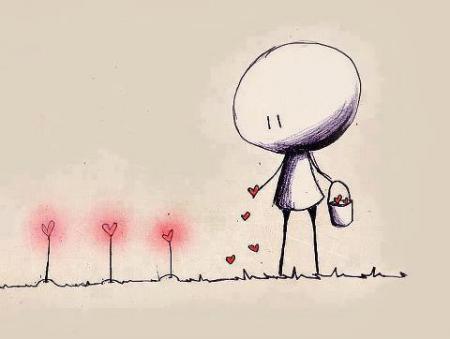
A: That goes back to today’s theme, “Bloom Where You Are Planted.” You are one of those individuals who ends up planting seeds in so many areas, and then all of a sudden, things just start blooming. One thing I want to talk about is hosting Awakin circles in Mumbai. What has been the impact of hosting them, both for you and your family, as well?
S: I was really reluctant because I didn’t know what my family would think, what my mom would think. Then, I thought, “Let me just jump in, and then we’ll see what happens.” If I can do it for a week, two weeks, one month, it doesn’t matter.
Slowly, I think even in less than a month, Awakin Wednesdays felt like a big family. And these circles have that kind of energy where they attracts those people who immediately become family. We’ve been going at it for two and a half years now. My family hosts Awakin Wednesdays even when I’m busy at work or traveling. It’s become a weekly thing. And I really feel that we definitely get more out of it than people who come. One of the things that my family’s really gotten is companionship.
For my mom, it’s become a bigger family than it was. Originally, I was really worried about my mom because I wasn’t sure that she would take this idea. But she did. She did a 10-day Vipassana retreat, she meditates, and now she also calls up my friends and says, “Hey let’s go for a film now.”
So we’ve really formed this community where we are open. It’s a space where we are ourselves, and I really value that. And it happens because of the setting of Awakin Wednesdays.
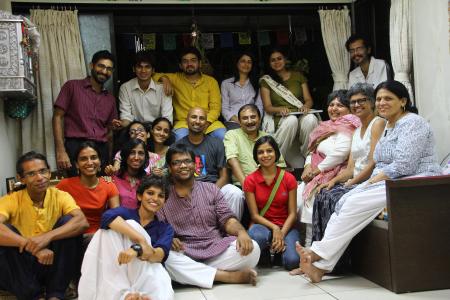
A: You are no stranger to challenge in your own personal life. I know you lost your father at a very young age. Can you share about the impact it had on you and your family, and the challenges you had to overcome?
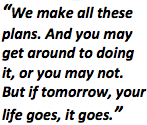 S: My dad was a really awesome human being. When he had money, he was like a king and he would constantly give it away. He didn’t even realize he was gifting to people, but he did. I think most of my values come from him.
S: My dad was a really awesome human being. When he had money, he was like a king and he would constantly give it away. He didn’t even realize he was gifting to people, but he did. I think most of my values come from him.
He was someone who would come home from work at eight o’clock and then say, “Okay, we’re going out of town. We’re going to get on a train and go to Goa!”
We needed bread and butter, but he’d also make sure we’d do all sorts of adventure rides. I think my sense of travel and crazy, adventurous spirit comes from him.
One lesson I’ve learned from him, from his death—or from his life—is that we make all these plans. And you may get around to doing it, or you may not. But if tomorrow, your life goes, it goes.
My father had all these plans. He started a factory. And one day, he was not there—he got in an accident and he died. And the next day, we were all waiting.
So every time I face a conflict of choices, of what to do, I ask myself that question: “If it was my last day today, where would I want to be?” And I think that gives you absolute clarity as to what you want to do next.
A: It’s great to see that you live out your values in that way. After growing up in India your whole life, you spent some time in California a few years ago, as a Metta Mentor and intern with ServiceSpace. Can you share about your experiences coming out here?
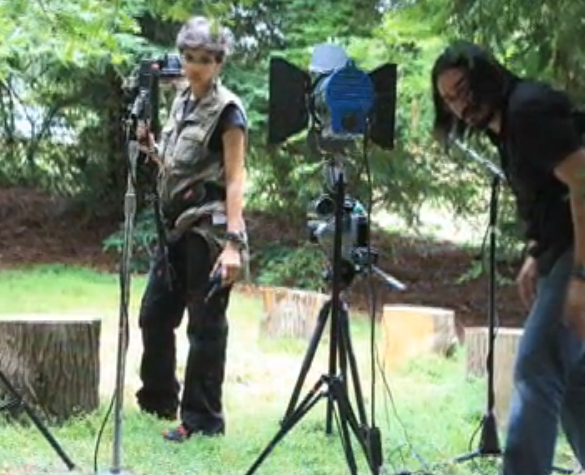 S: Being with Metta Mentors and ServiceSpace was amazing. I can’t count the number of gifts I got by being in that space. It was challenging. I love India. To be outside of India, I would be homesick quite often, but I met a lot of amazing people. I interviewed a lot of people because I was working on a documentary on nonviolence. And I learned a lot from my director, Lorenzo, who was asking a lot of the same questions that I was at that time: “How do you keep that balance between earning money and doing what you really love doing?” “What is it that you really want in life?” And things like that.
S: Being with Metta Mentors and ServiceSpace was amazing. I can’t count the number of gifts I got by being in that space. It was challenging. I love India. To be outside of India, I would be homesick quite often, but I met a lot of amazing people. I interviewed a lot of people because I was working on a documentary on nonviolence. And I learned a lot from my director, Lorenzo, who was asking a lot of the same questions that I was at that time: “How do you keep that balance between earning money and doing what you really love doing?” “What is it that you really want in life?” And things like that.
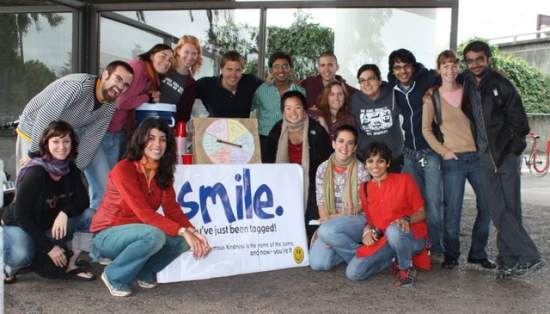
A: How do you find that balance between playing the role of earning money, and supporting your family, and service? Especially when some of those things may be in conflict with one another?
S: When I came back from the US, I was at the point where I was wondering whether I should jump completely into doing what I love—doing social work, and being at Manav Sadhna, or any other community where I would bloom very easily—or should I be in Bombay and also deal with the practical situations in life? I figured it’d be better for me to learn how to balance both.
So I work in ad films, and whatever I make from there I put it into things I love—whether it’s traveling, making documentaries for NGOs, etc. I feel like there’s no one answer. A lot of times, when people ask me this question, it’s something like going for a 10-day Vipassana meditation retreat. When you’re at the meditation center, it’s easy to meditate. But if you’re able to sustain that practice when you’re out in the world, then that’s it. So right now, my life is about constantly trying to achieve that practice of being rooted and grounded, even when I’m doing things like ad films or corporate videos, or whatever.
A: You kind of have two lives in the film world. On one side, you might be shooting a commercial or maybe even a movie. And then on the other side, you’re doing documentary filmmaking. How does doing these different types of projects speak to you, and how do you approach that?
S: Doing documentaries or making NGO films comes very naturally. It’s usually very difficult ask for money for those kinds of things. It’s something that gives me absolute pleasure, so I don’t even care about that. And it’s an easy set-up. You’re with people you want to be with. You’re doing things that you want to do.
On the other hand, ad films are things that I love doing. I love the hectic schedules. I love the act and creation of that entire product. But I do see a lot of waste. And I see people’s minds, which are more money oriented, results-oriented. My answer to that is to reach to the souls of people who are also working in those situations. I’ve been very lucky, especially after I came back from Metta Mentors, and when I joined ad films, I’ve found a lot of my kind of people. One of the producers who gave me a job will come on Wednesdays and sit in silence. So it’s about finding those personalities in people who do ad films.
.jpg)
Asha: Have you ever thought of doing projects addressing the violence against women in India?
S: Yes, I do get affected by those cases. Violence in India—what you see on television is one part—but if you go to every domestic household, you’ll see violence against women. And although I’m not someone who believes in activism anymore—I really want to go by this quote that says “Activists need to be more spiritual and spiritualists need to be more active.” That’s the balance I’m trying to find.
One of the things I want to work on is highlighting positive stories of women bringing about change in their own lives. There’s a library in Mumbai for Muslim women. It was opened up because of the law that Muslim women don’t get access to books outside their religion. So this library actually keeps books for these women. I want to focus on solutions like that and make stories on women who have figured out how to transform their situation.
Amit: That reminds me of yet another place of impact of you. You’ve been involved in putting on these 10-day festivals around the 15th Century poet, Kabir. What inspired you to get involved in this festival and what has moved you about Kabir personally?
S: Kabir is a 15th Century poet who spoke about giving up your religion, giving up your identity, and giving up everything that blocks you from touching a person and connecting heart-to-heart. And all the things he’s spoken about are relevant today. Any issues that you face right now, you can find a Kabir poem or quote that relates to it.
One of my favorites is about how you can water a plant as much as you’d like, but it will bloom only when the season is right.
The reason I chose to do the Kabir festival is because when I first heard a Kabir song, it brought a shift in me. I felt that my thoughts, my ideas were changing. That’s one of the big reasons I feel that it’s very important. Even if you’re working on big issues, it’s not the argument—not the activism—that will get you anywhere. It’s bringing that shift within people that will get you somewhere. I think through Kabir is one way that will get that shift in people.
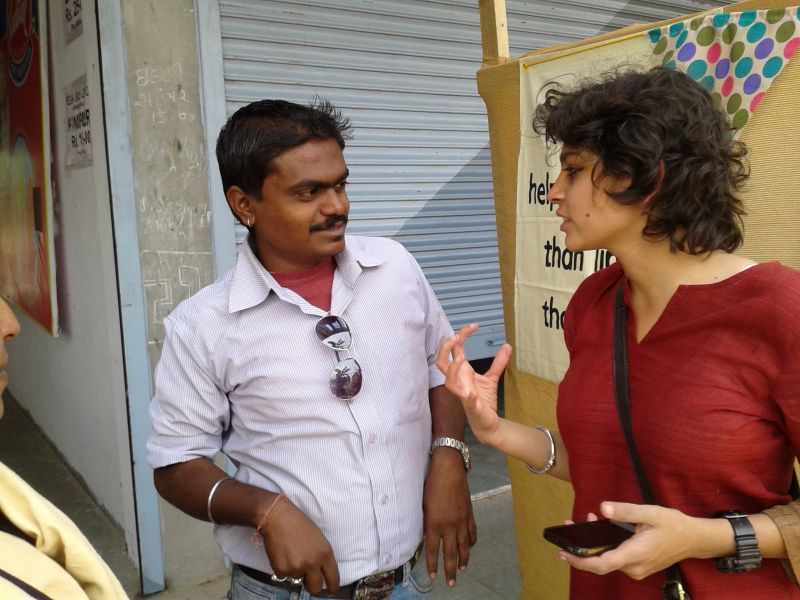
R: Sachi, it occurs to me that in India, you’re kind of an anomaly. Women don’t have the same level of freedom and ability to move around society and be adventurous that they may have the opportunities to do in the West. And yet, you’ve been doing that on your own for quite a long time.
I think when you came up to Friends Without Borders, you were 19 and you had taken a train from Ahmedabad to Delhi all by yourself. And that wasn’t the first time you’ve done something like that. You just have a way of moving about society as a young woman and not encountering the challenges that other women face or fear. How has that been possible for you?
S: Actually, the circumstances favored me. I was nine when I lost my father, and then we had to go to school alone. That itself was a big thing. Taking an auto rickshaw for almost 20 minutes to reach school, and then coming back by bus, was something I had never done. My mother was really busy making ends meet, so we were pretty much growing up on our own.
Earlier, of course, my mom didn’t have much of a say, because she was so busy doing things, and I could just do whatever I wanted to do. But when she had more free time, we had to sort out some stuff. And that’s why, even today, I have complete freedom. I don’t feel any resistance from my family. And I usually give it to them for giving me an open hand, and saying, “Go do what you want and what you love. And just be happy.”
Amit: Can you share about the role of random acts of kindness in your life?
S: In general, I really feel that random acts of kindness are not something I do intentionally. It comes naturally, and I prefer to do them naturally. I see a moment where I could be of service to somebody, and I take the opportunity of that moment to be of service. And I’m really fortunate and grateful that I have the presence of mind to see that moment and that opportunity.
There was one time I worked at a place for four months—my longest job. [Laughs] I used to travel in an auto rickshaw from my house to there, and there were these kids that used to always come to beg. When I was at the red light, I used to take off my headphones and have them listen to some music. I’d ask them what song they wanted to listen to, and they’d tell me. So I’d give them the headphones, and they’d put them on, do a little dance, and enjoy that moment until the signal turned green and we would go.
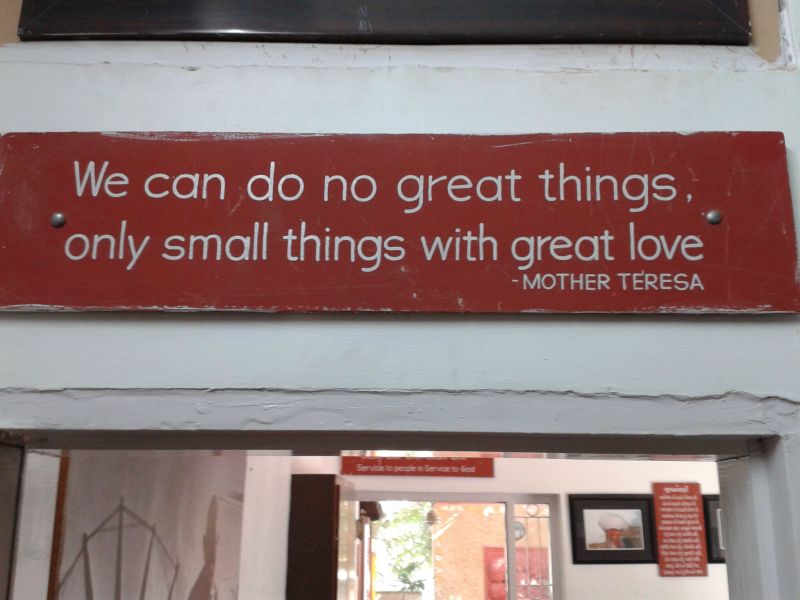
A: What direction do you see yourself going? Do you have a sense of what direction you’d like to move in, or what might call you to anchor down?
S: I know service is something I want to end up in. I’m really attracted to this quote, “Let me be used up.”
And I want to be like that—I want to be completely used up in service. I don’t know what direction I’m going in, really. I am floating. At this point, I’m not really worried about it. But, in a few years, I’ll probably have something that I’d like to commit and give my life to.
A: For a lot of people—and for me as well—being in limbo is very uncomfortable, internally. It’s very unsettling. How have you found equanimity with that?
S: I do have my moments in limbo—especially when I’m not working. And I am a workaholic. So, I move from project to project and I work a lot. But when I’m not working, t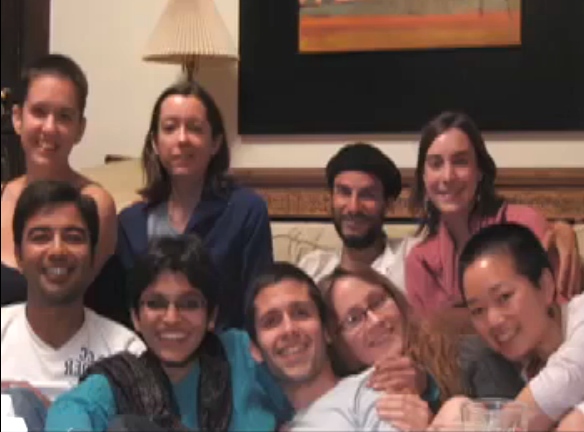 hat’s my period of limbo. I find myself sitting with those questions,until I can’t take them. And then, actually, I’ll call one of you guys and say, “Hey, I don’t know what I’m doing with my life. Help me!”
hat’s my period of limbo. I find myself sitting with those questions,until I can’t take them. And then, actually, I’ll call one of you guys and say, “Hey, I don’t know what I’m doing with my life. Help me!”
So my noble friends have really helped me. [Chuckles]
.jpg) Sachi Maniar is based in Mumbai, India, where she is a fierce change-maker, resourceful daughter and sister, social media freelancer, keen observer, tireless servant ladder, and sincere experimenter of truth. Her enthusiasm and zest for life continue to whisk her away on journeys far and wide. Sometimes she writes about them.
Sachi Maniar is based in Mumbai, India, where she is a fierce change-maker, resourceful daughter and sister, social media freelancer, keen observer, tireless servant ladder, and sincere experimenter of truth. Her enthusiasm and zest for life continue to whisk her away on journeys far and wide. Sometimes she writes about them.
Posted by Audrey Lin on Jul 4, 2013



On Jul 4, 2013 Vinya Sankaran Vasu wrote:
Post Your Reply